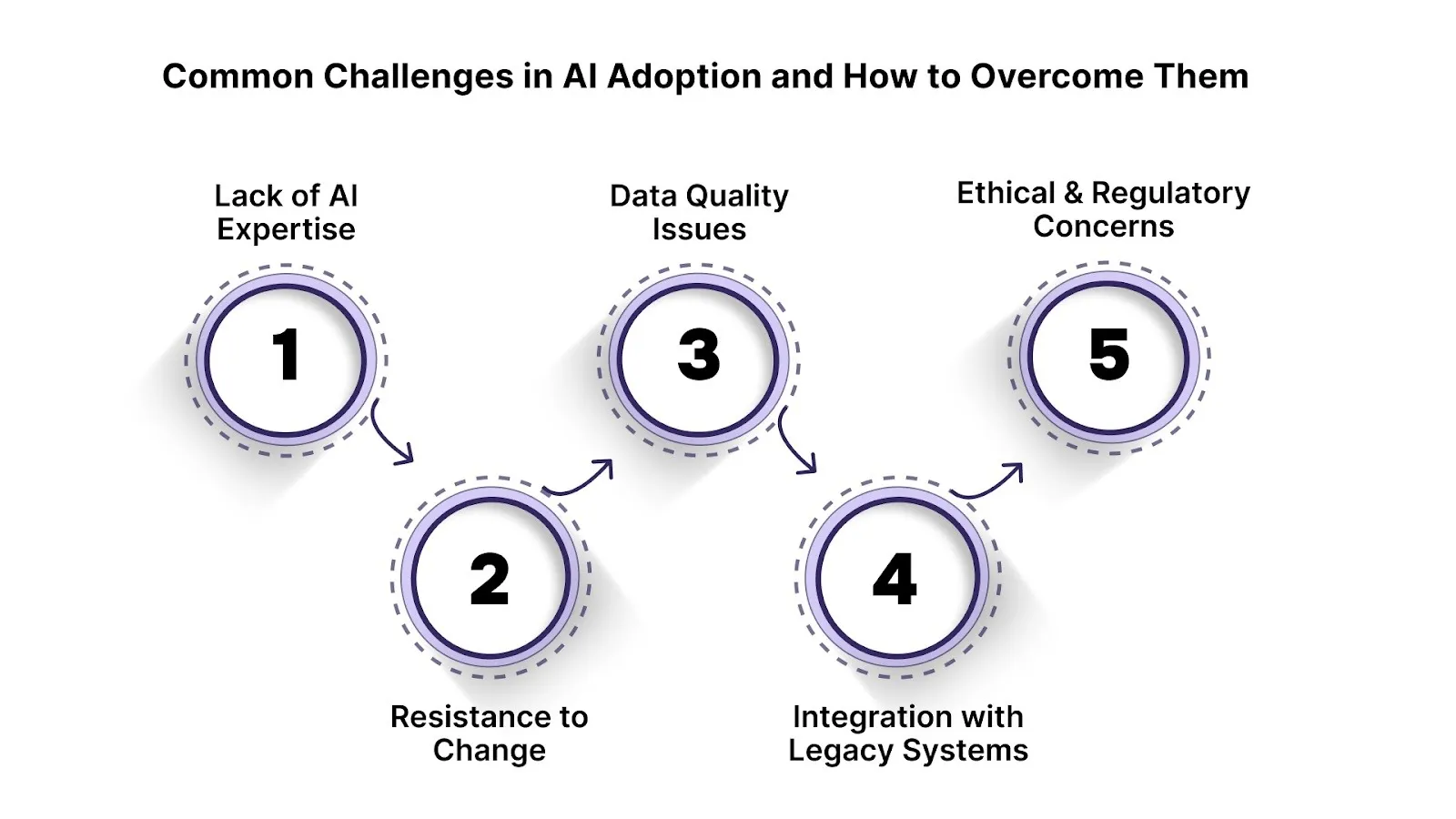Nov 13, 2025
AI in Leadership: Embracing Innovation and Responsibility

By Fraxtional LLC

Did you know that organizations whose senior leaders show real ownership and commitment to AI initiatives are three times more likely to outperform their peers? This connection highlights how leadership focused on AI can drive progress while keeping responsibility and purpose at the center of growth.
As a business leader, staying ahead of complex regulations while embracing AI is no easy task. Balancing growth with compliance is a significant challenge for today’s leaders. It’s about using AI effectively while ensuring it meets legal and ethical standards.
In this blog, we’ll explore the role of AI-first leadership in decision-making, compliance, and operations, along with the tools, skills, and ethical concerns involved.
TL;DR
- AI Leadership: AI adoption is crucial for leaders in industries with strict regulations and rapid decision-making requirements.
- Midlevel Managers: Midlevel leaders are essential for driving AI adoption and translating strategies into effective operational outcomes.
- AI Tools: Tools like predictive analytics, RPA, and NLP help leaders improve decisions and drive business performance.
- Skills Needed: Leaders must understand data, ethics, and strategy to lead effectively in AI-driven environments.
- Adoption Barriers: Challenges like talent shortages, data quality, and resistance to change need to be overcome for AI success.
Why AI-First Leadership is Non-Negotiable for Regulated Growth Firms?

AI-first leadership is more than a trend; it is becoming a necessity in industries where rapid decision-making and compliance are critical. As AI technology becomes integral to business strategy, leaders must adjust their approaches to stay competitive. By embracing AI, companies can drive growth while managing complexity and risk.
For leaders, understanding AI is no longer optional. To remain effective, they must be able to integrate it into daily decisions and operations. Here are a few reasons why AI-first leadership matters:
- Data-Driven Decision Making: AI enables leaders to make informed decisions based on accurate, real-time data rather than intuition alone.
- Regulatory Compliance: AI can help track changes in regulations and ensure businesses stay compliant, reducing the risk of costly errors in complex industries.
- Operational Efficiency: AI helps identify inefficiencies in operations, allowing businesses to improve processes and optimize resource allocation.
- Risk Management: With predictive analytics, AI can anticipate potential risks, giving leaders the tools to mitigate them before they become critical issues.
- Customer-Centric Insights: AI allows businesses to better understand customer behavior, leading to more tailored services and improved customer satisfaction.
With AI-first leadership setting the stage for growth, midlevel leaders become pivotal in ensuring that these strategies are implemented effectively.
How Mid-Tier Leaders Bridge Vision and Implementation

Midlevel leaders connect senior executives with operational teams to implement AI strategies. They ensure AI tools are applied effectively across the organization. Their ability to align AI with business needs can determine whether AI adoption succeeds or fails.
Here are key reasons why mid-level leaders are vital for AI integration:
- Operationalizing AI: Midlevel leaders implement AI strategies, making sure they align with department goals and are actionable on the ground.
- Communication Bridge: They translate high-level AI strategies into clear objectives for teams, ensuring understanding and engagement across all levels.
- AI-Driven Decision Making: By guiding teams to use AI insights, midlevel leaders ensure decisions are based on data rather than assumptions.
- Continuous Improvement: They monitor the impact of AI tools and adapt strategies to ensure continuous improvement and efficiency.
- Employee Training: Midlevel leaders are responsible for upskilling their teams to use AI tools and create a culture of continuous learning.
To fully adopt AI in leadership, it's necessary to understand the tools that will support your midlevel leaders in making informed decisions.
Top AI Tools Every Leader Should Use to Stay Competitive
AI tools are essential for leaders to make informed, data-driven decisions. They enable faster, more accurate analyzes that enhance strategy and operations. These tools are transforming how leaders approach risk management, compliance, and customer relations.
Below is a table summarizing key AI tools and their impact on leadership decisions:
Having the appropriate AI tools in place is essential, but developing the necessary skills in your leadership team will ensure these tools are used to their full potential.
Essential Skills for Effective AI-Driven Leadership in 2025

As AI becomes more integrated into leadership, new skills are required for leaders to succeed. They need to understand both the technology and its broader impact on business. These skills enable leaders to use AI to improve decision-making and manage complex challenges effectively.
Here are key skills in demand for AI-driven leadership:
- Data Literacy: Leaders must understand how to interpret and use data generated by AI tools to make informed decisions.
- AI Ethics: A strong understanding of AI ethics is essential to ensure transparency, fairness, and accountability in AI-driven decisions.
- Change Management: Leading AI adoption requires the ability to guide teams through organizational shifts and new technology integration.
- Strategic Thinking: Leaders need the ability to use AI insights for long-term strategic planning, not just short-term fixes.
- Technical Fluency: While leaders don't need to be engineers, they must have enough technical knowledge to communicate effectively with AI experts.
Need skilled leaders for effective AI-driven change management? Fraxtional offers leadership to manage your AI transformation and foster innovation.
Common Challenges in AI Adoption and How to Overcome Them

AI adoption comes with challenges that can slow down its effectiveness if not addressed. From technical barriers to cultural resistance, these obstacles can complicate efforts to integrate AI fully into a business. Overcoming these challenges is essential to ensure that AI delivers its full value and potential.
Here are some of the key challenges businesses face in AI adoption:
- Lack of AI Expertise: Many organizations struggle to find the right talent for implementing AI. Fraxtional leadership services can fill this gap with experienced executives.
- Resistance to Change: Employees and leaders may resist adopting new technologies, fearing job loss or discomfort with change.
- Data Quality Issues: AI tools rely on high-quality data, and poor data quality can lead to inaccurate results and poor decision-making.
- Integration with Legacy Systems: Existing infrastructure may not be compatible with new AI tools, creating integration hurdles that delay progress.
- Ethical and Regulatory Concerns: Compliance with regulations is crucial when adopting AI. Fractional leadership services by Fraxtional, such as CRO consulting, ensure businesses stay compliant while adopting AI solutions.
Once you've identified and addressed AI adoption challenges, the next step is to prepare your organization for the future of AI-driven operations.
How to Future-Proof Your Business for an AI-Driven World

To succeed in an AI-driven world, businesses in FinTech, banking, and crypto must adopt a forward-thinking approach to both technology and compliance. Preparing now ensures your operations stay agile, compliant, and ready for growth.
Key steps for success:
- Prioritize AI-Driven Compliance & Risk Management: Use AI to support regulatory requirements like KYC, AML, and transaction monitoring, reducing manual workload and ensuring compliance.
- Develop a Scalable AI Adoption Roadmap: Develop a clear AI roadmap that aligns with your goals, enabling growth while maintaining flexibility to adapt as needs change.
- Adopt Fractional AI Leadership: Bring in AI consultants to guide strategy and implementation without needing full-time hires, ensuring expert support where it’s needed.
- Invest in AI-Enabled Data Governance & Security: Set up AI-driven data governance to ensure accurate and secure data for decision-making, meeting industry standards.
- Cultivate a Compliance-First AI Culture: Train teams to adopt AI tools while balancing compliance needs, integrating AI into daily operations without sacrificing regulatory standards.
- Strengthen Bank Partnerships: Use AI to optimize partner selection, risk assessments, and ongoing monitoring, making it easier to maintain strong sponsor bank relationships.
- Focus on Flexible AI Solutions for Shifting Markets: In markets that change quickly, rely on AI to assess risks and predict trends, helping decision-making in private equity and other fast-paced sectors.
Taking these steps will position your business to not only handle the challenges of an AI-driven future but also seize new opportunities for growth and efficiency in an increasingly regulated environment.
Conclusion
AI is reshaping leadership, and businesses must adapt to stay ahead. With the right leadership, AI adoption becomes smoother, driving growth and ensuring compliance. Fractional leadership offers experienced executives without the cost of full-time hires, helping companies manage the complexities of AI integration.
At Fraxtional, we provide interim leadership in key compliance and risk roles, ensuring businesses stay on track with AI and regulatory requirements. Contact us today to discover how our fractional leadership services can help your business succeed in an AI-driven world.
FAQs
The 4 pillars of AI include data, algorithms, computing power, and human oversight. These elements are essential to creating and implementing AI systems that can learn, adapt, and perform tasks efficiently.
The 30% rule suggests that organizations should aim for AI to automate up to 30% of tasks in specific areas to improve productivity and allow human workers to focus on more strategic work. This helps balance AI’s role without entirely replacing human input.
The 7 C's of AI are: Clear, Consistent, Coherent, Collaborative, Conversational, Customizable, and Contextual. These principles help ensure that AI solutions are effective, user-friendly, and able to work in tandem with human efforts.
The 5 principles of AI include fairness, accountability, transparency, privacy, and security. These principles guide the ethical development and application of AI technologies in various industries.
The 7 main types of AI are: Reactive Machines, Limited Memory, Theory of Mind, Self-Aware, Artificial Narrow Intelligence (ANI), Artificial General Intelligence (AGI), and Artificial Superintelligence (ASI). These categories range from basic AI tasks to advanced systems capable of human-like cognition.
blogs
Don’t miss these
Let’s Get Started
Ready to Strengthen Your Compliance Program?
Take the next step towards expert compliance solutions. Connect with us today.




